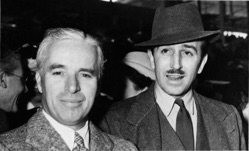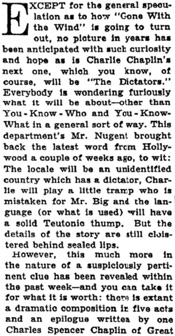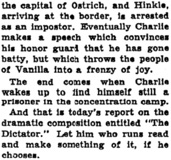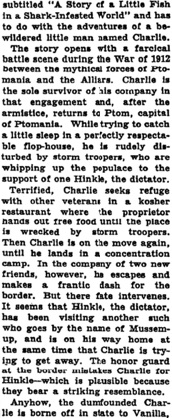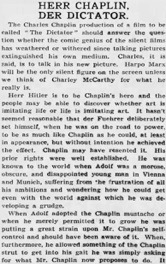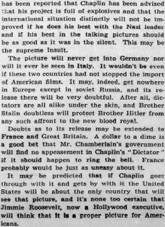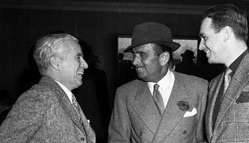The Great Dictator 1940 1941 next previous
The Great Dictator Clippings 22/369
New York Times, New York, February 26, 1939.
Charles Chaplin, Douglas Fairbanks Sr. and Jr. at the
racetrack, Los Angeles, March 6, 1939
& Charlie Chaplin and Walt Disney at the racetrack,
Los Angeles, March 6, 1939
& Murray Silverstone
(...) Photo, Motion Picture Herald, Aug. 28, 1937, detail
& Chaplin Film Will Start by March 15
Hollywood, Feb. 6 – Charlie Chaplin has completed the script
for his forthcoming film, The Dictators, according to Murray
Silverstone, head of United Artists operations. Production will
start before March 15 and early fall release is planned.
„The story is, naturally, concerned with dictators, but its
primary purpose is to make people laugh,“ Chaplin
told Silverstone. The film will open the fall season for U. A.,
Silverstone declared.
(...) Motion Picture Daily, Feb. 7, 1939
& HERR CHAPLIN, DER DICTATOR.
The Charles Chaplin production of a film to be called
„The Dictator“ should answer the question whether
the comic genius of the silent films has weathered or withered
since talking pictures extinguished his own medium.
Charles, it is said, is to talk in his new picture. Harpo Marx
will be the only silent figure on the screen
unless we think of Charley McCarthy for what he really is.
Herr Hitler is to be Chaplin‘s hero and the people
may be able to discover whether art is imitating life or life
is imitating art. It hasn‘t seemed reasonable that der
Fuehrer deliberately set himself, when he was on the road
to power, to be as much like Chaplin as he could,
at least in appearance, but without intention he achieved
the effect. Chaplin may have resented it. His prior
rights were well established. He was known to the world when
Adolf was a morose, obscure, and disappointing
young man in Vienna and Munich, suffering from the
frustration of all his ambitions and wondering
how he could get even with the world against which he was
developing a grudge.
When Adolf adopted the Chaplin mustache or when
he merely permitted it to grow he was putting
a great strain upon Mr. Chaplin‘s self-control and and should
have been aware of it. When, furthermore, he allowed
something of the Chaplin strut to get into his gait he was
simply asking for what Mr. Chaplin now proposes
to do. It has been reported that Chaplin has been advised
that his project is full of explosives and that the
international situation distinctly will not be improved
if he does his best with the Nazi leader and
if his best in the talking pictures should be as good as it was
in the silent. This may be the supreme insult.
(...) Chicago Tribune, Feb. 7, 1939
„A Story of a Little Fish in a Shark-Infested World“
Editorial content. „ADVANCE NOTES
ON ,THE DICTATORS‘
EXCEPT for the general speculation as to how Gone
With the Wind is going to turn out, no picture in years
has been anticipated with such curiosity and hope as is Charlie
Chaplin‘s next one, which you know, of course, will
be The Dictators. Everybody is wondering furiously what
it will be about – other than You - Know- Who and
You - Know - What in a general sort of way. This department‘s
Mr. Nugent brought back the latest word from Hollywood
a couple of weeks ago, to wit: The locale will be an unidentified
country which has a dictator, Charlie will play a little
tramp who is mistaken for Mr. Big and the language (or what
is used) will have a solid Teutonic thump. But the details
of the story are still cloistered behind sealed lips.
However, this much more in the nature of a suspiciously
pertinent clue has been revealed within the past
week – and you can take it for what it is worth: there is extant
a dramatic composition in five acts and an epilogue
written by one Charles Spencer Chaplin of Great Britain,
domiciled in Los Angeles, Calif., and entitled The
Dictator. This piece of dramatic literature is subtitled A Story
of a Little Fish in a Shark-Infested World and has
to do with the adventures of a bewildered little man named
Charlie.
The story opens with a farcical battle scene during the War
of 1912 between the mythical forces of Ptomania
and the Alliars. Charlie is the sole survivor of his company
in that engagement and, after the armistice, returns
to Ptom, capital of Ptomania. While trying to catch a little
sleep in a perfectly respectable flop-house, he is
rudely disturbed by storm troopers, who are whipping up the
populace to the support of one Hinkle, the dictator.
Terrified, Charlie seeks refuge with other veterans
in a kosher restaurant where the proprietor hands
out free food until the place is wrecked by storm troopers.
Then Charlie is on the move again, until he lands
in a concentration camp. In the company of two new friends,
however, he escapes and makes a frantic dash for
the border. But there fate intervenes. It seems that Hinkle,
the dictator, has been visiting another such who
goes by the name of Mussemup, and is on his way home
at the same time that Charlie is trying to get away.
The honor guard at the boarder mistakes Charlie for Hinkle –
which is plausible because they bear a striking
resemblance.
Anyhow, the dumfounded Charlie is borne off in state
to Vanilla, the capital of Ostrich, and Hinkle, arriving
at the boarder, is arrested as an impostor. Eventually Charlie
makes a speech which convinces his honor guard
that he has gone batty, but which throws the people of
Vanilla into a frenzy of joy.
The end comes when Charlie wakes up to find himself
still a prisoner in the concentration camp.
And that is today‘s report on the dramatic composition
entitled The Dictator. Let him who runs read and make
something of it, if he chooses.“
Redaktioneller Inhalt
The Great Dictator 1940 1941 next previous

